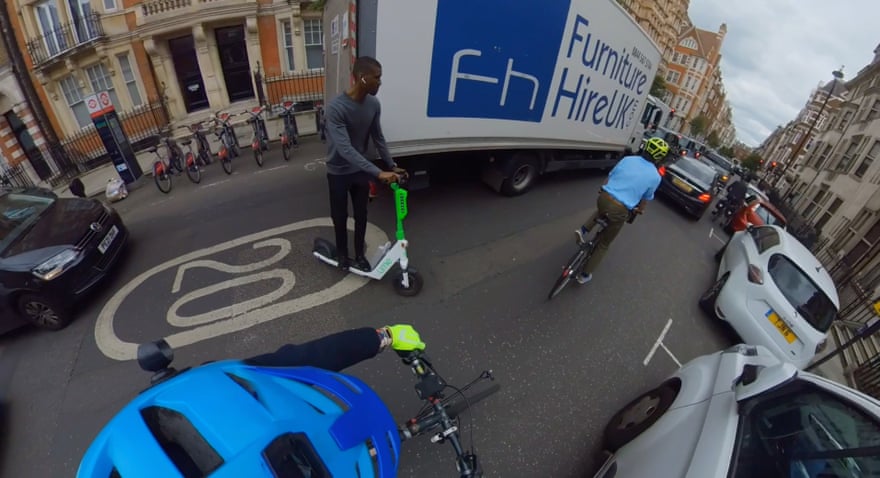‘It’s not a political thing’: Jeremy Vine on cycle safety – and that helmet cam
While riding around London, the BBC presenter talks about the dangers and benefits of getting about on two wheels
Cycling along a busy one-way street in central London, followed by a black Mercedes and a line of other cars, Jeremy Vine ponders how best to stay safe: move a bit closer to the side, allowing room for a potentially close overtake, or stick to the centre of the lane?
“It’s a bit of a conundrum,” he admits. “Let’s take the primary position and see if we get any argy-bargy. Think of it as an experiment.”
As we pedal along, the Mercedes driver stays yards behind, making no effort to squeeze past or even edge closer. “This guy behind us is being lovely,” Vine grins. “We shouldn’t always paint cycling as dangerous. The most dangerous thing you can do is to always be on your sofa, eating Pringles.”
Vine remains best known for a lunchtime show on BBC Radio 2, and his eponymous morning TV programme on Channel 5. But if you follow the presenter on Twitter, you might be forgiven for thinking his main job is, in fact, the journeys he makes between them.
While quite a few cyclists post clips from on-bike video cameras to highlight dangerous driving, in the past couple of years Vine has taken this concept forward in several ways.
To begin with, he doesn’t just post unadorned clips. Vine’s contributions are micro-documentaries, adding explanatory graphics, music and rewound footage to show different angles, something possible because of the hi-tech 360-degree camera he uses, perched atop his helmet.
While many of the videos show instances of bad driving – Vine has passed about 15 of the most egregious examples to the police – he also posts vignettes of uplifting interactions with drivers and other cyclists, and once sent a case of beer to a truck driver who had been particularly considerate. His most recent video highlighted how he failed to see some pedestrians trying to use a zebra crossing as he shot past.
“People say ‘Why do you film it?’, and the answer is, sometimes I want to look back and see what I’ve done wrong. When I approached a junction and felt unsafe, was I in the wrong place?” he explains.
Vine, 57, says he began cycling after becoming “fatter and sadder” in his mid-40s, and realising the gym was not the answer when he had visited just once in a year of membership – to use the whirlpool bath.
He now rides 15 miles each weekday to, from and between his jobs, and is again slim and in obvious, vigorous good health. “It’s all you need to stay fit,” he says. “As someone brilliantly said, the bike is a flying machine powered by muffins. There is just the risk of sudden death. And that’s what began to make me more assertive about safety.”
Vine began cycling with what he now terms “a ‘kumbaya’ attitude – let’s just all be friends”, but eventually concluded he had to start using a video camera. “I thought, I need to properly try to understand what’s putting me at risk and take whatever measures I can. For me, that was enforcement. I think that in the end, bad drivers respond to enforcement.”
This aspect of his cycling gained prominence in 2017 when a driver who beeped her horn and shouted abuse at Vine was convicted of threatening behaviour and a driving offence. A video of the incident he posted to Facebook was viewed more than 15m times.
I join Vine for the final leg of one weekday commute, from the BBC radio studios in central London, heading west towards his home. An easily recognisable figure in his bright yellow gloves and camera-topped helmet, Vine is often spotted by other riders, and increasingly, he says, by drivers. “I got a cab driver saying: ‘I’m not coming anywhere near you, because I know who you are.’ I thought, that’s maybe good.”
READ RELATED: Breast cancer survivor details excruciating battle with breast implant illness
Our experiment with the courteously driven Mercedes comes just beyond the BBC studios, on a stretch of one-way street where, Vine says, he has regularly faced danger, highlighting his much-stated belief that the only way to improve cycle safety is to create better road infrastructure.

“It can’t just be a coincidence that all the bad drivers end in places like this,” he says, as we ride farther west. “It’s bad roads and bad drivers coming together. That’s clearly the thing.”
Unfortunately for Vine, while one part of his commute, Hammersmith Broadway, now has a separated bike lane, one installed on another section, Kensington High Street, was removed by the local council after just seven weeks, following opposition from a small number of local people.
We ride along the latter road, dodging cars parked in what was once the cycle lane. Vine points to burn marks still visible from where it was removed. “Every day I see this, and it drives me nuts,” he says.
Sitting in a cafe on a sidestreet, Vine explains how he “became more and more immersed in this issue of why can’t I travel to work safely”, something for which he is routinely targeted for abuse on social media, as well as sniping articles in some newspapers.
He is worried about the way that making our cities safer to travel in for pedestrians and cyclists has somehow become a polarising issue. “We have let so much of our cities go over to cars that we’re having to pull it back, and that requires incredibly difficult politics.”
Although, he says: “This is not a political thing – if you can create safe cycling space, you have the potential to free up thousands of miles of the transport network, and cleaning up the city, making it safer.”
But what is frustrating to him is that as you do that, “you run into the sort of opposition that doesn’t make any sense at all, the most bizarre pressure groups.”
While he has an equivocal relationship with Twitter, Vine can give as good as he gets, not least his mischievous habit of fanning the myth that the curiously top-down footage shot by his camera actually comes from a drone flying above him.
He thinks carefully about featuring the faces of miscreant drivers, reserving this for the most obviously aggressive or law-breaking, and does not, for example, publicly endorse low-traffic neighbourhood schemes he has never seen.
But even as a BBC employee, Vine says his obvious views on the need for more bike infrastructure are not a problem for the corporation. “I think the general principle is, I can speak truthfully and from my own point of view about issues like cycling down this street, which I do every day, or road deaths. We’re not impartial about road death – it’s a bad thing, and cycle safety is a good thing, and it’s clear that the more segregated cycle lanes you have, the safer cyclists are.”
As shown by the brief experiment with the black Mercedes, Vine is as much fascinated by the psychology of driving as he is by the politics of road infrastructure, forever trying to puzzle out what might put him in danger.
“For too long we’ve had the view that if you’re driving a car, and you’re going at 29mph on a 30mph street, it doesn’t matter what happens in front of you, you’re not to blame,” he says. “You become much more conscious of other road users when you are vulnerable yourself.
“But something odd has happened with car safety. Cars are sold on the basis you’ll be moving around in a massive shell, with airbags. No one who buys a car ever says: ‘What will happen if this hits a child?’ Clearly the mindset has changed. The cars have become obese, followed by the drivers.”
Source: Health & wellbeing | The Guardian




